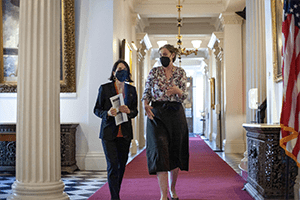By Xander Landen/VTDigger
Though they adjourned last month, Vermont lawmakers are preparing to log back on to Zoom once again next week.
Legislators will return June 23 for a remote veto session, during which Democratic leaders will attempt to revive the three bills that Gov. Phil Scott killed this year. They also plan to pass a housing reform bill, S.79, that was blocked by Republicans before the Legislature concluded its work in May.

Senate President Pro Tempore Becca Balint, left, and her chief of staff Carolyn Wesley walk through the Statehouse in May.
Earlier this month, Scott vetoed two proposed charter changes that would allow noncitizens to vote in local elections in Winooski and Montpelier. And in May, he struck down another bill, S.107, that would have shielded the records of young adults accused of certain crimes from public disclosure.
Democratic leaders in the House and Senate will need to rally two-thirds majority votes to override Scott’s veto pen. In the House, that means they need the support of 100 legislators. In the Senate, they need 20.
The House approved the Montpelier charter change, 103-39, and Senate approval came on a 21-9 vote, showing Democrats may have the votes to override the governor.
The Winooski charter change had slightly less support, passing 99-44 in the House and 20-10 in the Senate.
In the House, the juvenile records passed in a vote of 88-36, though many legislators were absent. In the Senate, the breakout of the vote wasn’t recorded.
House Speaker Jill Krowinski, D-Burlington, said Democrats are working to build a coalition of support with independents, Progressives and Republicans to gather the support needed to override Scott’s vetoes. In the House, there are currently 92 Democrats, seven Progressives, 46 Republicans and five Independents.
Krowinski said Democrats are “working really hard” to get the votes but wouldn’t say whether her party has them yet.
“There’s strong support for these, but I am working really hard to make sure that every ‘i’ is dotted and every ‘t’ is crossed,” Krowinksi said.
Senate President pro tempore Becca Balint, D-Windham, said her chamber has the votes to override Scott on all three bills. The Senate is composed of 23 Democrats and/or Progressives and seven Republicans.
The juvenile records bill that Scott vetoed would have allowed law enforcement to release initial arrest information of those 19 and under if they were charged as adults for any “Big 12” offenses, such as murder, sexual assault or aggravated assault.
But unlike current practice, law enforcement officials wouldn’t be able to release information of juveniles charged with other crimes — including motor vehicle crashes in which someone was killed.
Under the legislation, the age threshold would increase to 20 next year.
Scott said he was concerned about raising the age at which those charged with crimes receive protections meant for juveniles in the criminal justice system.
But Balint said S.107 is part of the Senate’s larger criminal justice reform efforts and that releasing the records of young people who are charged with crimes can harm them in the long run. “I think it’s important for people to understand that it’s not an outlier,” Balint said of the legislation. “It is our belief that people are able to be rehabilitated.”
Rep. Pattie McCoy, R-Poultney, the House’s minority leader, said she hoped the Republican caucus would vote to uphold the governor’s veto pen. But with only 46 members in the lower chamber, she said House GOP members “need to bring five more people along” to sustain Scott.



